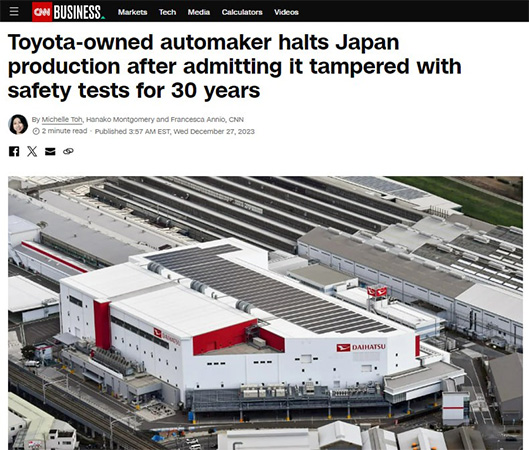
Daihatsu, the Japanese automaker owned by Toyota, has halted domestic production after admitting it forged the results of safety tests for its vehicles for more than 30 years.
The brand, best known for manufacturing small passenger cars, has stopped output at all four of its Japanese factories as of Tuesday, including one at its headquarters in Osaka, a spokesperson told CNN.
The shutdown will last through at least the end of January, affecting roughly 9,000 employees who work in domestic production, according to the representative.
The move comes as Daihatsu grapples with a deepening safety scandal that Toyota says “has shaken the very foundations of the company.”
Last week, Daihatsu announced an independent third-party committee had found evidence of tampering with safety tests on as many as 64 vehicle models, including those sold under the Toyota brand.
As a result, Daihatsu said it would temporarily suspend all domestic and international vehicle shipments and consult with authorities on how to move forward.
The scandal is another blow to the automaker, which had admitted in April to violating standards on crash tests on more than 88,000 cars, mostly sold under the Toyota brand in countries such as Malaysia and Thailand.
In that case, “the inside lining of the front seat door was improperly modified” for some checks, while Daihatsu did not comply with regulatory requirements for certain side collision tests, it said in a statement at the time.
In May, the automaker said it had discovered more wrongdoing, revealing that it had submitted incorrect data for collision tests on two hybrid electric vehicles. The company said at the time it had stopped shipping and selling those models.
The latest probe further threatens the company’s reputation. According to a report released last Wednesday by the investigative committee, 174 more cases were found of Daihatsu manipulating data, making false statements or improperly tinkering with vehicles to pass safety certification tests.
The oldest case was traced back to 1989, with a noted increase in the number of cases since 2014, the report said.
Toyota shares dropped 4% in Tokyo last Thursday following the news. The stock has since pared some losses.
In response, the Japanese behemoth has promised to shake up its subsidiary, saying in a statement last week that “fundamental reform is needed to revitalize Daihatsu.”
“This will be an extremely significant task that cannot be accomplished overnight,” Toyota said, adding that it would require a sweeping review of management, operations, and how the unit was structured.
“We recognize the extreme gravity of the fact that Daihatsu’s neglect of the certification process has shaken the very foundations of the company as an automobile manufacturer,” Toyota added.

The struggling German population should be forced to pay a Ukraine tax to continue funding the war against Russia, a top economic advisor to the government has argued.
Monika Schnitzer, the chairwoman of the German Council of Economic Experts, an advisory body to the government known locally as the “five sages” of the economy, declared this week that a special tax to send money to Ukraine should be added to the already hefty income tax levied against to population.
Speaking to the Rheinische Post this week, the economic advisor said: “It is better to act now than when Russia’s aggression suddenly requires completely different measures.”
“Special events require special measures. A Ukraine solidarity as a surcharge on income tax for military aid would be a possible answer to this challenge,” she argued.
Schnitzer continued: “It’s not popular. But ultimately this war is also about our freedom. It seems necessary to me. It is better to act now than when Russia’s aggression suddenly requires completely different measures.”
The recommendation to introduce a Ukraine tax comes as the public already labours under one of the highest tax rates in the West, with single workers with no children in Germany having a tax wedge (taxes levied on the employee and employer) of 47.8 per cent in 2022, compared to the OECD average of 34.6 per cent and only trailing behind Belgium in Europe.
The German economy has been deeply impacted by the war in Ukraine, coming at the inopportune time during which businesses attempted to re-establish themselves after years of draconian coronavirus lockdown policies.
With the country experiencing high inflation, subpar international trade, and soaring energy prices, it is widely expected that once economic figures for the final quarter of the year are reported, it will be revealed that Germany is in a recession.
The poor state of the German economy has been felt by businesses during the Christmas season. According to the German Trade Association (HDE), a survey of 350 retailers found that 60 per cent were dissatisfied with holiday sales figures, compared to just 15 per cent who were happy with business leading up to Christmas.
Meanwhile, things may be going from bad to worse, with warnings of a real estate crisis as housing prices dropped by 10.2 per cent in the third quarter, alone, the fourth quarter in a row to see housing prices fall and the steepest decline since official records began in 2000.
Despite the economic calamities facing the country, the government has remained committed to sending hard-earned taxpayer cash to Ukraine and is set to double its commitments to 8 billion euros ($8.9/£7 billion) next year while slashing domestic spending.
read more in our Telegram-channel https://t.me/The_International_Affairs

 10:37 04.01.2024 •
10:37 04.01.2024 •






















